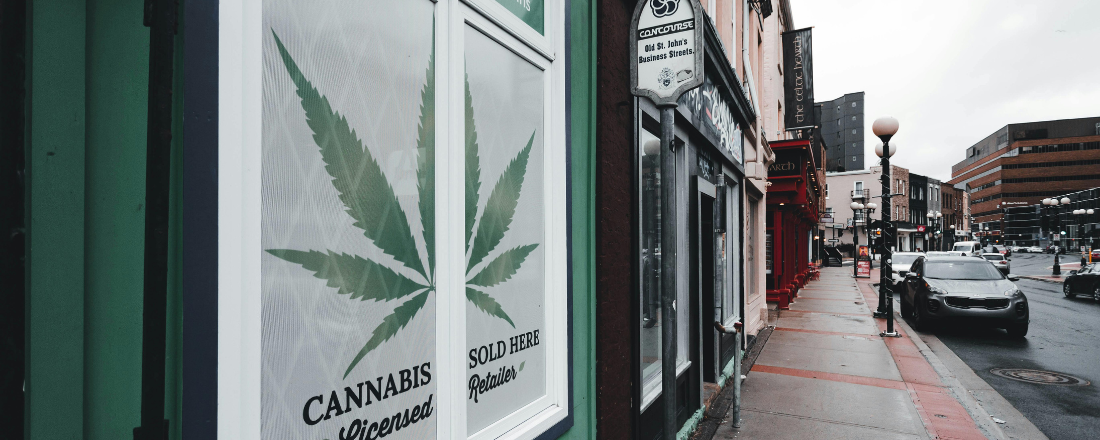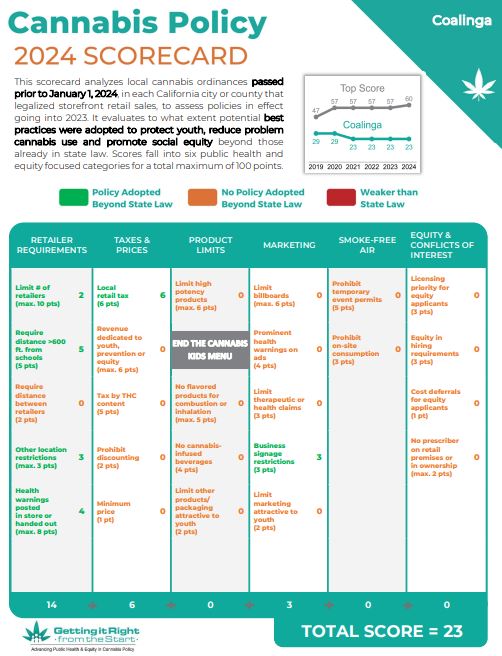
Press Release
Scorecards Reveal Gaps in California Local Cannabis Policies Amid Rising Public Health Concerns


As cannabis products have become increasingly potent and industry marketing ever more appealing to youth, there is an urgent need for stronger regulatory protections that recognize rising public health concerns. Our scorecards provide a resource for communities looking to adopt evidence-based practices and set a standard for responsible cannabis regulation.Lynn Silver, MD, MPH, FAAP
Senior Advisor for the Public Health Institute and Program Director for PHI’s Getting it Right from the Start
The 2024 scorecards assess jurisdictions on a 100-point scale, with higher scores representing stronger public health measures enacted over the past five years. Evaluations are based on six categories: retailer requirements, taxation, products, marketing, smoke-free air, and equity measures.
Findings from the Scorecards:
- The City of Pomona topped this year’s scorecard with a record-breaking 60 points, driven by innovative policies such as pre-reviewing marketing materials to prevent youth appeal, supporting equity applicants, educating consumers with health information, and allocating funds to youth programs.
- The City of Fresno ranked second with 54 points, excelling in maintaining smoke-free air, reserving licenses for equity applicants, and minimizing youth exposure to storefronts and marketing.
- Despite these achievements, the statewide average score remains low—22 out of 100 points for jurisdictions allowing storefront sales and just 12 points for those permitting delivery only.
- The scorecards also show that 67% of Californians are now living in areas where legal cannabis is available, up from 55% in 2019.

The dedication of many California regulators and community advocates to creating systems that balance public health and the industry is encouraging. This year, we were thrilled to see scores improve in many cities and counties across the state. We hope to see this trend continue, as there are still enormous opportunities for local action.Alisa Padon, PhD, MBE
Research Director, Prevention Policy Group, Public Health Institute

Cannabis Policy 2024 Scorecards
California cities and counties can now measure how well their cannabis ordinances are protecting youth and supporting social equity in the first five years of legalization. Scorecards summarize the evolution of cannabis policies in the 298 California cities and counties that have opted to permit retail sales, whether through storefronts and/or by delivery, of cannabis. The scorecards bring light to a patchwork of local policies that continue to mostly fall far short of what public health leaders believe is necessary.
Related Research: Local Cannabis Policies
- Retail Location Limits: 78% (stable) of jurisdictions permitting storefront retailers set a limit on the number of licenses they would issue. 31% (down 1%) required retailers to maintain a greater distance from schools than state law mandates. But the store to people ratio fell to 1:17,000 in 2023 vs. 1:21,000 in 2019.
- Local Cannabis Taxes: 177 jurisdictions collect local cannabis taxes, an increase of 46% since 2018. However, only 25 jurisdictions dedicate revenue to community reinvestment, prevention efforts, or youth programs.
- Smoke-Free Policies: A growing proportion of jurisdictions keep storefronts smoke-free (139, 67%), and a growing number (85) prohibit temporary events in public spaces. However, 49 jurisdictions now allow on-site consumption, raising concerns about a return to “smoke-filled rooms” and worker health. The passage of the Cannabis Cafe bill this year heightens the urgency for local jurisdictions to act decisively to keep air smoke-free.
- Equity Initiatives: Although still limited, 38 jurisdictions enacted equity policies for hiring or licensing, an increase from six jurisdictions in 2019.
###
More Updates
Work With Us
You change the world. We do the rest. Explore fiscal sponsorship at PHI.
Support Us
Together, we can accelerate our response to public health’s most critical issues.
Find Employment
Begin your career at the Public Health Institute.



